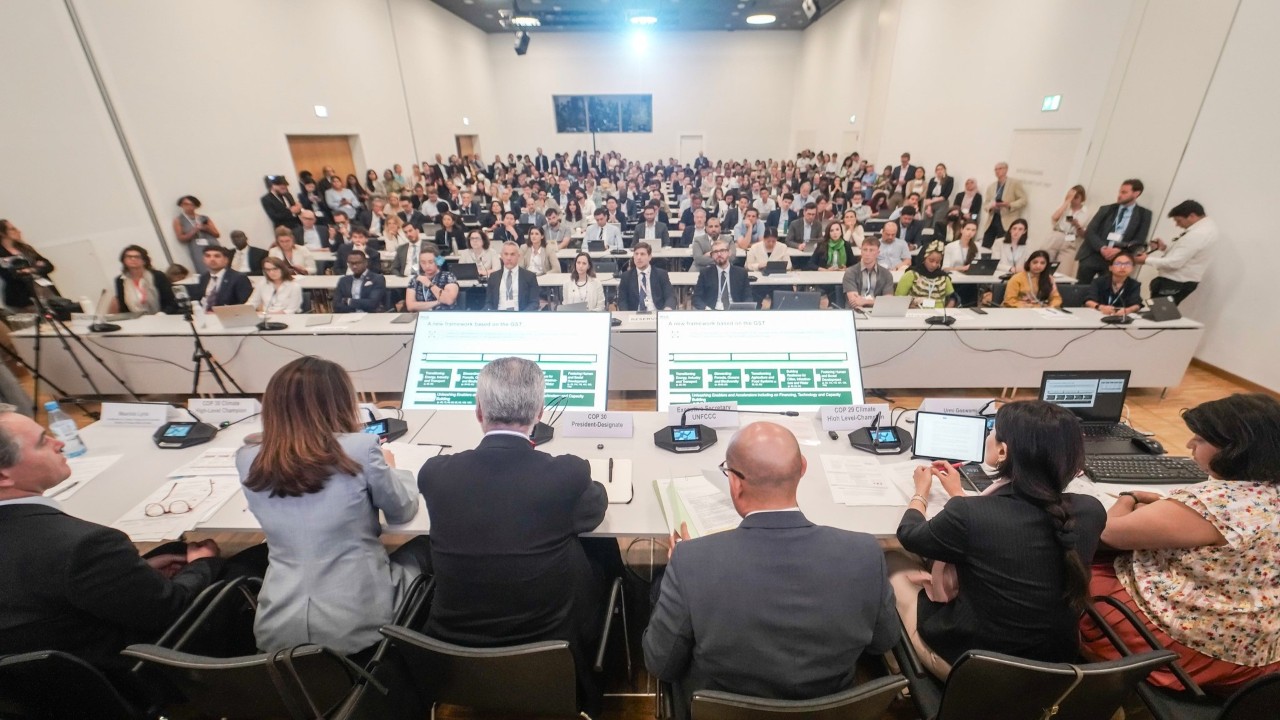"The time for the Action Agenda is now," call COP High-Level Champions
At the center of Bonn talks, COP High-Level Champions underscore non-state actors’ crucial role in Pari Agreement goals

By Franciéli Barcellos de Moraes | COP30
As the world prepares for COP30, the pivotal role of the High-Level Climate Champions is central to translating the Conference's Action Agenda into concrete results. They serve as a bridge between negotiating governments and civil society, the primary force responsible for implementing agreements.
On Friday, June 20, in Bonn, Germany, the collaborative efforts of Nigar Arpadarai (COP29) and Dan Ioschpe (COP30) to ensure Action Agenda’s success were highlighted. The event, part of the 62nd session of the Subsidiary Bodies of the United Nations Framework Convention on Climate Change (SB62), took place in the Bangkok Room of the Bonn World Conference Center. It detailed the fourth letter from the Brazilian Presidency of the Conference and drew a full audience.
→ The letter can be read in full here
"For me, the clearest reason for this Agenda’s importance is that it brings to the COP the actors who will implement the decisions — and who cannot negotiate,” said Ambassador André Corrêa do Lago, the COP30 President. “We, the negotiators, represent states, the countries. Implementation, however, is somewhat different. Governments approve, but others are responsible for carrying things out — of course, with governmental support. I am fully convinced that we must increasingly involve those who are the true implementers of the decisions made."
"This is our role — to convey these messages globally, cross-reference information, mobilize and drive momentum, always to generate more climate action towards the objectives of the Paris Agreement"
— DAN IOSCHPE, COP30 Climate Champions
This is where the Champions’ role comes into play, as one of their key tasks is to serve as a dynamic bridge between negotiators and non-state actors, including companies, non-governmental organizations, cities, and civil society. While negotiators set the targets, Ms. Arpadarai and Mr. Ioschpe are responsible for mobilizing these other actors, ensuring climate agreements translate into tangible impacts for a sustainable future.
“This is our role — to convey these messages globally, cross-reference information, mobilize and drive momentum, always to generate more climate action towards the objectives of the Paris Agreement,” noted Dan Ioschpe, Brasil’s High-Level Champion. He emphasized that civil society must advance rapidly, scaling up projects using existing technological knowledge, as well as the necessary human and financial resources.
“My focus this year is to elevate the real economy ecosystem to the next level. This means placing small and medium-sized enterprises (SMEs) — the beating heart of our economies — at the center,” added her colleague, Nigar Arpadarai, Azerbaijan’s Champion, regarding their work with the private sector. Ms. Arpadarai, a member of Azerbaijan’s National Assembly, presented data showing that SMEs account for 90% of employment and 40% of GDP, making them central to a just and inclusive transition. “The green transition is a marathon, not a sprint — and we must run it together. Much has been done already, dear friends, but it is still not enough,” she concluded.
▸Meet the profiles of Ms. Arpadarai and Mr. Ioschpe, as well as former High-Level Champions.
The Action Agenda proposes a unified and cross-cutting strategy to accelerate the implementation of agreements under the United Nations Framework Convention on Climate Change (UNFCCC) and the Paris Agreement. It is one of the four pillars of the COP30 Presidency—along with the Heads of State Summit, negotiation, and mobilization. During the first decade of the Paris Agreement, more than 475 initiatives were created under the Agenda, engaging over 40,000 businesses, investors, civil society entities, local governments, and other stakeholders.
Also present were Ana Toni, COP30 CEO; Mauricio Lyrio, Brazil’s Secretary for Climate, Energy and Environment at the Ministry of Foreign Affairs (Ministério das Relações Exteriores) and BRICS Sherpa; Simon Stiell, UNFCCC Executive Secretary; and Sônia Guajajara, Brazil’s Minister for Indigenous Peoples. Following the opening session, negotiations among Parties continued.
English version: Trad. Bárbara Menezes
Proofreading by Enrique Villamil
